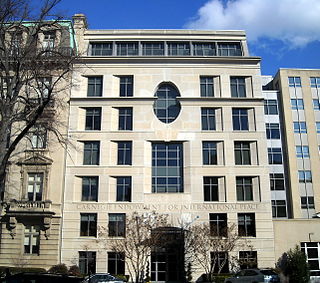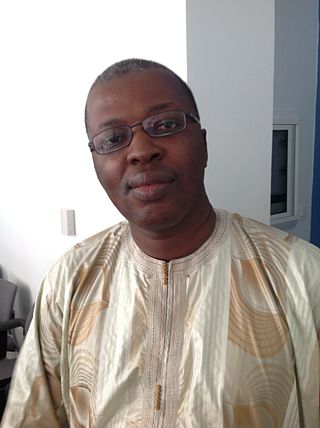
The Carnegie Endowment for International Peace (CEIP) is a nonpartisan international affairs think tank headquartered in Washington D.C. with operations in Europe, South and East Asia, and the Middle East as well as the United States. Founded in 1910 by Andrew Carnegie, the organization describes itself as being dedicated to advancing cooperation between countries, reducing global conflict, and promoting active international engagement by the United States and countries around the world.

Charlotte Bunch is an American feminist author and organizer in women's rights and human rights movements. Bunch is currently the founding director and senior scholar at the Center for Women's Global Leadership at Rutgers University in New Brunswick, New Jersey. She is also a distinguished professor in the Department of Women's and Gender Studies at Rutgers.

The Fuqua School of Business is the business school of Duke University in Durham, North Carolina. It enrolls more than 1,300 students in degree-seeking programs. Duke Executive Education also offers non-degree business education and professional development programs. Its MBA program was ranked the 9th best business school in the US by The Economist in 2019, and 13th in the US by The Financial Times in 2022. Fuqua is also currently ranked 6th for having the lowest acceptance rate and 10th for having the highest application yield across the top 50 MBA programs in the US.

A truth commission, also known as a truth and reconciliation commission or truth and justice commission, is an official body tasked with discovering and revealing past wrongdoing by a government, in the hope of resolving conflict left over from the past. Truth commissions are, under various names, occasionally set up by states emerging from periods of internal unrest, civil war, or dictatorship marked by human rights abuses. In both their truth-seeking and reconciling functions, truth commissions have political implications: they "constantly make choices when they define such basic objectives as truth, reconciliation, justice, memory, reparation, and recognition, and decide how these objectives should be met and whose needs should be served".

Juan E. Méndez is an Argentine lawyer, former United Nations Special Rapporteur on Torture and Other Cruel, Inhuman or Degrading Treatment or Punishment, and human rights activist known for his work on behalf of political prisoners.
The University of Iowa College of Law is the law school of the University of Iowa, located in Iowa City, Iowa. It was founded in 1865. Iowa is ranked the 28th-best law school in the United States by the U.S. News & World Report "Best Law School" rankings.
Transitional justice is a process which responds to massive human rights violations through judicial redress, political reforms in a region or country, and other measures in order to prevent the recurrence of human rights abuse. Transitional justice consists of judicial and non-judicial measures implemented in order to redress legacies of human rights abuses. Such measures "include criminal prosecutions, truth commissions, reparations programs, and various kinds of institutional reforms". Transitional justice is instituted at a point of political transition classically from war to positive peace, or more broadly from violence and repression to societal stability and it is informed by a society's desire to rebuild social trust, reestablish what is right from what is wrong, repair a fractured justice system, and build a democratic system of governance. The core value of transitional justice is the very notion of justice—which does not necessarily mean criminal justice. This notion and the political transformation, such as regime change or transition from conflict are thus linked to a more peaceful, certain, and democratic future.
Vetting is the process of performing a background check on someone before offering them employment, conferring an award, or doing fact-checking prior to making any decision. In addition, in intelligence gathering, assets are vetted to determine their usefulness.
David Tolbert currently serves as the third president of the International Center for Transitional Justice, a global human rights organization with headquarters in New York.

Abdul Tejan-Cole is a Sierra Leonean Oku legal practitioner and former Commissioner of Sierra Leone's Anti-Corruption Commission. He was awarded the 2001 Human Rights Watch award.

Christian Wenaweser is a Liechtenstein diplomat.

Duke University School of Law is the law school of Duke University, a private research university in Durham, North Carolina. One of Duke's 10 schools and colleges, the School of Law is a constituent academic unit that began in 1868 as the Trinity College School of Law. In 1924, following the renaming of Trinity College to Duke University, the school was renamed Duke University School of Law.
Alexander Lionel Boraine was a South African politician, minister, and anti-apartheid activist.
Priscilla Hayner has received degrees from Earlham College and the School of International and Public Affairs at Columbia University.
Paul van Zyl grew up in South Africa during the apartheid era and served as the Executive Secretary of South Africa’s post-apartheid Truth and Reconciliation Commission from 1995 to 1998.
Memorialization generally refers to the process of preserving memories of people or events. It can be a form of address or petition, or a ceremony of remembrance or commemoration.
Robin Vincent, CMG, CBE was an international expert in the administration of justice, and a major contributor to the creation and effective functioning of international criminal tribunals.
Pablo de Greiff is a Colombian academic and a human rights activist, who served as the first United Nations Special Rapporteur on the promotion of truth, justice, reparation and guarantees of non-recurrence. In January 2015 he was also asked to be part of UNIIB, a United Nations mission of Independent Experts to address the situation in Burundi. From 2019 to 2020 he was part of a group of experts advising the UN Human Rights Council on its preventive functions. Since 2014 he is a Senior Fellow at the Center for Human Rights and Global Justice of the School of Law at New York University, where he directs both the Transitional Justice Program and the Prevention Project.
The Accountability and Justice Act of 2008 is a legislative act passed by the Iraqi Council of Representatives in January 2008.
The Commission of Inquiry to Locate the Persons Disappeared during the Panchayat Period (1990–1991) is a truth commission established in Nepal in 1990 after the end of the autocratic Panchayat Regime by the first post-Panchayat Prime Minister Krishna Prasad Bhattharai. The commission was set up to examine allegations of human rights violations and inquire about enforced disappearances during the Panchayat system from 1961 to 1990. A report was officially submitted to the government in 1991, but it was made public only in 1994. The commission identified 35 persons disappeared on about one hundred studied cases. However, no alleged perpetrators were judged.








